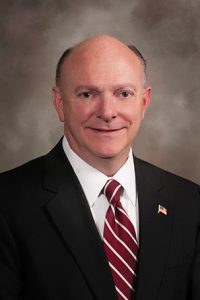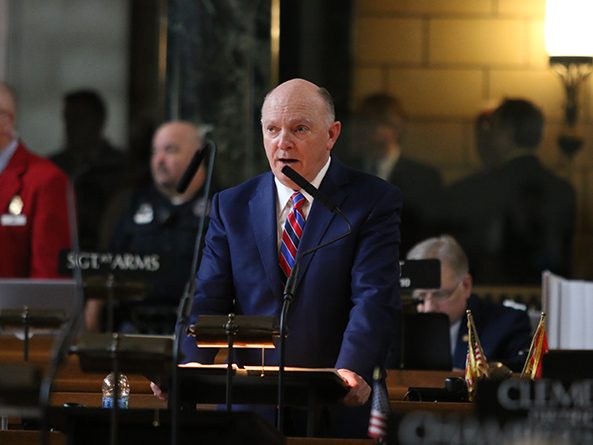Income tax credit on paid property taxes stalled
Senators considered a proposal April 3 to provide income tax credits that partially offset the amount that Nebraskans pay in property taxes.
As introduced by Papillion Sen. Jim Smith on behalf of Gov. Pete Ricketts, LB947 would eliminate the state’s current property tax credit program and instead would provide Nebraska homeowners and agricultural and horticultural landowners a refundable state income tax credit equal to 10 percent of their property taxes paid.
The bill also would reduce the top individual and corporate income tax rates to 6.69 percent by 2020 and would transfer $10 million to a job training fund.
Smith said that the state’s income tax rates, overreliance on tax incentives and high property taxes make it uncompetitive with other states when trying to attract new businesses.
A pending Revenue Committee amendment would replace the bill, instead providing a refundable state income tax credit for agricultural and horticultural landowners equal to 2 percent of their property taxes paid beginning this year. The credit would increase in annual increments until it reaches 20 percent in 2027.
Homeowners would receive a 1 percent income tax credit on their property taxes paid this year, with a $25 cap for 2018. The credit would increase to 20 percent by 2030, when it would be capped at $500.
The amendment would maintain funding for the current property tax credit program at $224 million annually.
The proposal also would decrease the state’s top corporate income tax rate—which is applied to taxable income in excess of $100,000—from 7.81 percent to 6.84 percent over five years. Individual income tax rates would not change.
Finally, the amendment would direct the state treasurer to transfer $5 million from the state’s cash reserve fund to a job training fund and approximately $34 million to the state’s general fund to cover the proposal’s cost for the first year.
LB947 is the only property tax relief bill that could garner enough votes to advance from the Revenue Committee this session, Smith said, and its failure to pass could increase the odds that voters will approve a proposed ballot initiative that mirrors LB829, introduced by Bayard Sen. Steve Erdman. That bill would provide Nebraskans a refundable state income tax credit equal to 50 percent of their property taxes paid to school districts during the taxable year.
Smith said that Erdman’s proposal would leave the state with a $1.1 billion budget shortfall next year that could be filled only by cutting state spending and by raising other taxes. He said his proposal, which would provide for $600 million in property tax relief when fully implemented, is a more responsible approach.
“Sen. Erdman’s alternative is dangerous,” Smith said. “You will not be able to cut enough to pay for LB829 or the ballot initiative cost.”
Sen. Lydia Brasch of Bancroft supported the amendment, saying that LB947 would provide “slow and gradual” increases in property tax relief.
“If we would have done this 10 years ago, we would have that 20 percent reduction and a better three-legged stool,” she said, referring to the state’s tax system, which comprises income, property and sales taxes.
North Platte Sen. Mike Groene also supported the amendment, saying that another property tax relief proposal that came before the committee this session would raise taxes without controlling school spending.
“I stand in support of [the amendment] because at least it doesn’t raise my taxes,” he said.
Erdman opposed the amendment, saying that other bills, including his LB829, offer more substantial property tax relief. Erdman said that a 2 percent credit on an agricultural landowner’s property tax bill is not enough when valuations on agricultural land have increased approximately 5.6 percent per year over the past 12 years.
“I didn’t come here to take this back to my people and say this is property tax relief, because this is not property tax relief,” he said. “This is too little, too late.”
Erdman filed a motion to bracket the bill, which effectively would end debate on it for this session. The motion failed on a 9-25 vote.
Sen. Burke Harr of Omaha supported the amendment’s increase in workforce development funding, but he said the state could not afford the proposed credits and rate cut. Ricketts has asserted that the state can afford the proposal based on a growth rate of 6 percent, Harr said, but the Legislature’s economic forecasting board predicts that Nebraska’s economy will grow by only 4.9 percent next year.
Harr added that, under the amendment, he would have received a $25 credit on his most recent property tax bill of more than $6,200.
“If you think that amounts to a hill of beans, you’re crazy,” he said. “If you think that appeases me and says the property tax problem is solved, you’re crazy.
Sen. Curt Friesen of Henderson said he could not support the amendment because it does not address the state’s overreliance on property taxes to fund its public schools.
“I’ve always said I’m willing to work to accomplish this over a period of years,” he said, “but to do this over a period of 12 years is not substantial, it’s not upfront and it doesn’t deal with school funding the way I’ve envisioned it.”
Lincoln Sen. Kate Bolz said that the amendment’s increasing cost over time would leave the state unable to fund priorities like education, child welfare services and the Department of Correctional Services. The amendment would reduce the state’s cash reserve fund to approximately $256 million, only about 35 percent of the Appropriations Committee’s goal, she said.
“This isn’t the right proposal, and it isn’t the right time,” Bolz said.
Sen. Tom Briese of Albion also questioned how the state would pay for the proposal. Briese said his LB1084, which would raise the state sales tax rate and eliminate several state sales tax exemptions on services, would provide more property tax relief more quickly than LB947.
“You’re not going to deliver the immediate and substantial property tax relief that Nebraskans need without changing how we pay for things,” he said, “and that means replacing property taxes with other forms of revenue.”
The Legislature moved to the next item on the agenda before voting on the committee amendment or the bill. Per a practice implemented last year by Speaker Jim Scheer, the sponsor of a bill that is facing a potential filibuster must demonstrate sufficient support for a cloture motion before the measure will be scheduled for additional debate.


